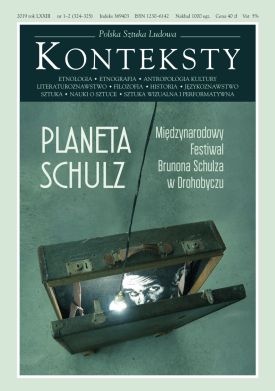Schulz – ironiczny ład i dyskurs uwodzicielski
Schulz – Ironic Order and Seductive Discourse
Author(s): Jerzy JarzębskiSubject(s): Language and Literature Studies
Published by: Instytut Sztuki Polskiej Akademii Nauk
Keywords: Bruno Schulz
Summary/Abstract: An examination of key mechanisms governing the entire oeuvre of Bruno Schulz, with the article pertaining in particular to those questions of the aesthetics of the works of the author of Sanatorium pod Klepsydrą (The Hourglass Sanatorium) that are linked with an artistic creation of reality and an attitude towards the real world, inscribed into that creative gesture. Jarzębski is interested primarily in the “ironic order” dominating the world depicted in Schulzian prose. This order has an underpinning of irony and, moreover, is closely connected with “passion”, which makes its presence known in the “seductive” element of each story – a fact that Schulz understood well and in assorted ways played out artistically. The oeuvre of the author of Sklepy cynamonowe (The Cinnamon Shops) is an affirmation of order and beauty, but this is an affirmation whose tools are “the grotesque” and “laxity” (this is why in the case of Schulz beauty is closely affiliated with tawdriness and ugliness, and order – with carnival-like chaos). At the same time Schulz’s imagination often runs in a circle – from mundane order towards strange fantasticality breaking the framework of time, towards something unusual participating in some sort of an out of the ordinary order, so as to ultimately return to the order of everyday time and the mundane. In this fashion the “explosion of fantasy” and “féeries of poetry” end in “bankruptcy” and are fulfilled in a “spectacular fiasco”, which denotes a return to order and an affirmation of daily life. This whirling circle is set into motion by a dual force – gravity and irony, sensitivity to the dramatic nature of existence and the farcicality of life. The force in question is also that of spinning a story. The latter is always a form of founding the world – a recounted world gains a “putting-in-order sense”. Simultaneously, the same story is seductive and does not make pronouncements about the world but tries to win over the listener (reader); this, in turn, is the reason why it becomes a form of an ”erotic game”, active flirtation involving “the grotesque” and “beauty”, (male) “tawdriness” and (feminine) “perfection”. Jarzębski concluded: “Even if the order of the world is in some way objective, it enters into our life and begins to mean something to us together with the birth of desire – this is why Schulzian stories are in their profoundest essence spectacles of eternally vital passion”.
Journal: Konteksty
- Issue Year: 324/2019
- Issue No: 1-2
- Page Range: 351-355
- Page Count: 5
- Language: Polish
- Content File-PDF

